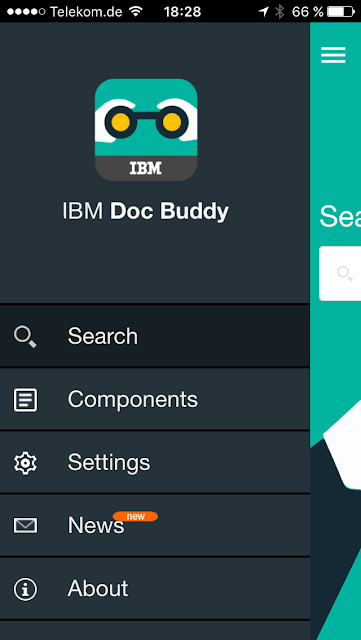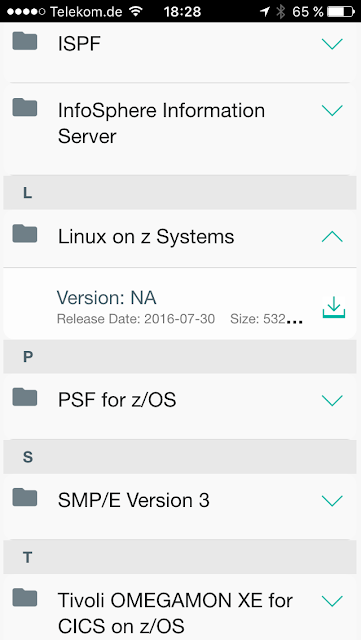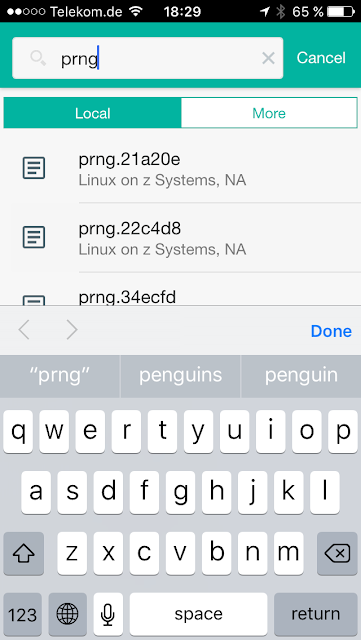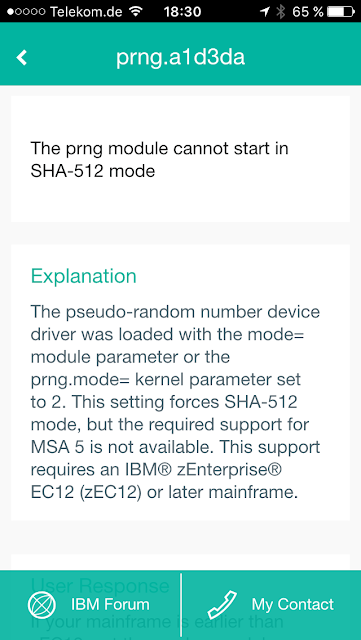Showing posts with label Linux. Show all posts
Showing posts with label Linux. Show all posts
July 18, 2018
July 16, 2018
July 15, 2018
July 14, 2018
July 17, 2017
May 12, 2017
May 2, 2017
April 3, 2017
RHEL 5 end of service
This enterprise distribution has been in the market now for more than ten years. Now it's time to move on. Best of course would be the RHEL 7 stream, which right now is at RHEL 7.3. Every day you stay on the old release without security updates is increasing the risk of being hacked!
March 21, 2017
SHARE San Jose 2017
Labels:
Blockchain,
Docker,
Hyperledger,
KVM,
Linux,
Linux on z,
Linux_z,
LinuxOne,
SHARE,
z/VM,
zLinux
February 22, 2017
SUSE Linux Enterprise 12 Service Pack 2 (SLES 12 SP2) released
On November 8th 2016 eleven months after the last service pack SUSE has released the latest updated to their flag ship server distribution. SUSE also has a blog post with some more details.
The kernel level for 12.2 is kernel-4.4.21-69.1. This is a jump in the kernel version from the old 3.12 based kernel. It's the same major kernel level that's being used by Canonical for Ubuntu 16.04. And with that kernel a lot of new functionality is delivered. SUSE and IBM worked hard to ensure that for applications it behaves the same.
What's new (details see documentation and release notes):
- The release notes states that SUSE now fully supports MariaDB. They have version 10.0.27 inlcuded
- Networking:
- For OSA the specification of a portname is no longer needed
- Hipersockets can now be bridged to Erhernet
- Layer2 offloads are enabled
- The 10 GbE RoCE card now also supports the DAPL/OFED stack on
- Encryption and security updates
- Glibc has now the first set of SIMD exploitations for z13
- Toolchain module updates
- Full KVM host support - so you can now run SLES12 as a Hypervisor on System z an Linux boxes
- ....
- Complete SLES 12 documentation
- SLES 12.2 release notes (s390x version)
- z Systems / s390x specific information
- release notes for High Availability Extensions (z Systems / s390x version)
- release notes for SDK (z Systems / s390x version)
- SUSE tuning guide updated to SP2
- Whitepaper on SUSE's module concept
- IBM documentation on developerworks
- Docker support statement
February 16, 2017
IBM z Systems Processor Optimization Primer
For z Systems optimizations are essential to keep the consolidation ratio high and make the best use of the hardware. As more and more open source software is ported to Linux on z / LinuxONE Kevin Shum has posted his excellent "BM z Systems Processor Optimization Primer" on developerworks.
There is a long version with all the details and a shorter summary presented at last SHARE.
This is a "must read" for everyone working on compilers and inline assembly on z.
There is a long version with all the details and a shorter summary presented at last SHARE.
This is a "must read" for everyone working on compilers and inline assembly on z.
November 4, 2016
Red Hat Enterprise Linux (RHEL) 7.3 released
On November 3rd 2016 Red Hat released the next regular update to their flag ship operating system.
The kernel level for 7.3 is kernel-3.10.0-514.el7.
Here is my usual summary of links to more information:
- Complete RHEL 7 documentation
- RHEL 7.3 release notes
- RHEL 7.3 known issues
- RHEL 7.3 kernel CVE and bugfix documentation
- RHEL 7 installation guide
- RHEL 7 installation guide for z
- RHEL 7 performance tuning guide
- IBM documentation on developerworks (7.2 version)
- RHEL limits
- RHEL lifecycle with the end date for the Extended Update Service (EUS)
- RHEL7 package list
Also in September Red Hat achieved EAL4+ / common criteria certification for RHEL 7.1:
(updated 4/11/2016)
October 12, 2016
Oracle 11 R2 now certified on RHEL 7.1 for Linux on z / LinuxONE
The certification is finally done with Oracle 11.2.0.4 and RHEL 7.1. It's highly recommended that you upgrade to the latest fixpacks though. Read more in the IBM Flash or go directly to Oracle support and read the Oracle Note (requires Oracle login):
- 1967531.1: "Requirements for Installing Oracle 11.2.0.4 RDBMS on RH7 on IBM: Linux on System z (s390x)" - which has detailed installation instructions, which are a must read before trying to install.
September 22, 2016
IBM Doc Buddy now has Linux and z/VM messages
IBM Doc Buddy is a mobile app that allows for retrieving explanation on IBM z error message codes. Now you can also get Linux and z/VM messages offline explained with this app.
You can get the application from Apples Appstore or from Google Play, depending on the mobile device you use.
The information is the same as in the books (note that Ubuntu and Red Hat don't have included the message numbers yet):
- Kernel Messages on SUSE Linux Enterprise Server 12 SP1 - SC34-2747-01
- Kernel Messages (Kernel 4.4) - SC34-2599-11
- z/VM: CP Messages and Codes (6.3)
- ...
 |
| Setup screen |
 |
| Select component |
 |
| search |
 |
| Get result (can be scrolled!!) |
Labels:
documentation,
Linux,
Linux on z,
Linux_z,
LinuxOne,
messages catalog,
z/OS,
z/VM,
zLinux
September 19, 2016
Performance whitepapers for IBM Enterprise Content Management with Filenet for Linux on z Systems
IBM has a good portfolio of Enterprise Content Management (ECM) products. One of them is IBM FileNet. Storing a lot of data and finding content is something that z Systems does really well. So after the first whitepaper concentrating on FileNet there is a new paper that adds IBM Content Navigator and IBM Spectrum Scale (formerly known as GPFS) to the mix.
This new paper is split into two parts:
This new paper is split into two parts:
- The first part with the title "IBM Enterprise Content Management for Linux on z Systems Scale-Out Case Study (Part 1): Single ECM Node with XFS and IBM Spectrum Scale 4.2" is available on Partnerworld (direct pdf download).
- I'll update this post as soon as the second part is available
September 12, 2016
Java performance improvements
IBM continues to improve the performance of Java on the mainframe. To show this I've taken a snapshot of the performance improvements during the latest Java releases. The operating system was a SLES 12 SP1 and this was run on a z13 LPAR with 6 cores and SMT enabled.
As you can see you there is a solid 33% percent improvement going from the first Java 7 version to the latest Java 8 SR3 FP10 version.
So the first recommendation when you are having Java performance problems with Linux on System z is to try a more advanced Java version.
As you can see you there is a solid 33% percent improvement going from the first Java 7 version to the latest Java 8 SR3 FP10 version.
So the first recommendation when you are having Java performance problems with Linux on System z is to try a more advanced Java version.
September 5, 2016
Ubuntu 16.04.1 and kernel support map
End of July Canonical released the fix update for their first mainframe release. No new features but a lot of fixes, for Linux on z many installation fixes. If you are using (or planning to use) Ubuntu 16.04 LTS it's time to think about the life cycle. Here is the support map from Ubuntu Wiki:
 |
| Source: Ubuntu Wiki as of 9/5/2016, License: Creative Commons Attribution-ShareAlike 3.0 License |
My recommendation is the following:
- For production use stay with 16.04.1 stream for the life of the product. Plan for a check point in spring 2018 and check if you need the additional hardware enablement delivered with the 16.04.5 kernel.
- For development use you probably want the latest kernel anyhow. There 16.04.2-16.04.4 are valid choices. However I'd rather upgrade everything and go with the 16.10, 17.04, 17.10 versions. This will give you the latest versions of all the open source packages as well.
June 25, 2016
Fedora 24 for IBM z Systems and Linux ONE released
The new Fedora 24 for z Systems / s390x / LinuxONE was released 6/21/2016 together with the Intel version. Thanks to the Fedora team for closing the time gap between the architectures! The kernel level is kernel-4.5.5-300.
As usual the download is available from the Fedoraproject site and the respective mirrors and known issues are covered in the wiki.
May 20, 2016
Red Hat Enterprise Linux 6.8 released
On May 11 2016 Red Hat has announced the availability of RHEL 6.8. This marks the transition into what in Red Hat's product life cyle is called production phase 2. The kernel level is now kernel-2.6.32-642.el6, for the main bug fixes see the kernel update description.
As usual there are the release notes and the technical notes in two separate documents. The complete documentation can be reached from the Red Hat documentation page (you need to select "6" on the left bar).
The IBM documentation for RHEL 6.4 on developerworks still applies for this release.
From a technical perspective the most important part are the z13 performance patches, which will make certain workloads run faster than on previous releases.







